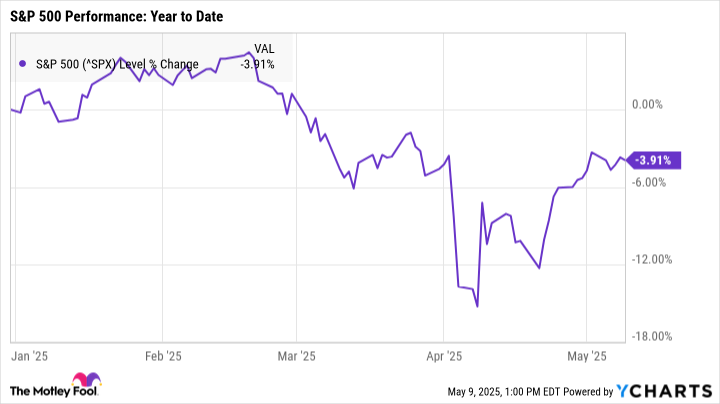With new tariffs taking effect, many experts are warning about the economic implications they may have.
The Federal Reserve Bank of New York estimates a 30% chance of a recession beginning in the next 12 months, according to data released in early May. Analysts at Goldman Sachs and J.P. Morgan put the odds of a recession at 45% and 60%, respectively. Both firms noted that tariff policies, specifically, have increased recession risks for 2025.
It’s still too early to say where the economy or the stock market may be in a few months or a year. But if a recession or crash is looming, there are three common mistakes to avoid at all costs right now.
Image source: Getty Images.
Mistake no. 1: Panic-selling your investments
If you’re worried that stock prices will plummet, it may be tempting to sell all your investments now to get out ahead of a crash. While that makes sense on paper, the market is often unpredictable — and selling at the wrong time could be incredibly costly.
For example, say that you sold your investments in early April after the market took a sharp turn for the worse. That may have seemed like the safest move at the time, but because stocks almost immediately rebounded, you’d have ended up selling at rock-bottom prices — potentially locking in steep losses.
Then, if you’d decided to reinvest later after the market had rebounded, you’d have been forced to buy at higher prices. Mistiming the market in this case would have hit you with a double whammy: selling at a substantial loss while also paying a premium to get back in the market.
Those who stayed in the market throughout the downturn, though, reaped the biggest rewards. Not only did those investors avoid losing money by not selling, but they also earned the highest returns during the market’s recovery period.
Mistake no. 2: Relying too heavily on stock price
Investing during the market’s downturns is one of the easiest and most effective ways to generate long-term wealth. When you invest at lower prices, you can load up on stocks at a discount while also setting yourself up for significant gains when the market recovers.
However, knowing where to invest during a downturn can sometimes be difficult. Even strong companies will often see their stock prices plummet during a recession or crash, but that doesn’t necessarily mean they aren’t good buys. Similarly, sometimes weak companies will surge in price when the market is thriving, but they’ll struggle to pull through tough economic times.
It’s more important than ever, then, to focus on a company’s underlying foundations rather than stock price. Strong companies will have taken steps to prepare for an economic downturn, like solidifying their competitive advantage and avoiding unnecessary risk. They’ll also have a competent leadership team at the helm, ready to guide the company through rough patches.
When a company is healthy at its core, it’s far more likely to survive a slump. Stock price is only one part of the equation, and by focusing more on business fundamentals, it will be easier to choose the right investments.
Mistake no. 3: Investing short-term cash
Continuing to invest consistently is a smart strategy, but ensuring you can leave your money in the market for at least a few years is equally important. Pulling your money out of the market after stock prices sink could result in hefty losses, so it’s wise to only invest cash you won’t need for the foreseeable future.
All recessions are different, so there’s no way to know exactly how long any future downturns will last. Historically, though, the average S&P 500 (^GSPC 3.26%) bear market has lasted around nine months, with longer downturns going on for around two years.
Before you buy, be sure you’re willing to stay invested for at least that long. Ideally, it’s wise to plan on investing for around five to seven years, at least, to give your portfolio plenty of time to recover before you need that money.
The stock market’s future may be uncertain, but if a crash or recession is looming, the right strategy is key. By doing your best to keep a clear head, it will be easier to manage your portfolio effectively and protect your finances as much as possible.






